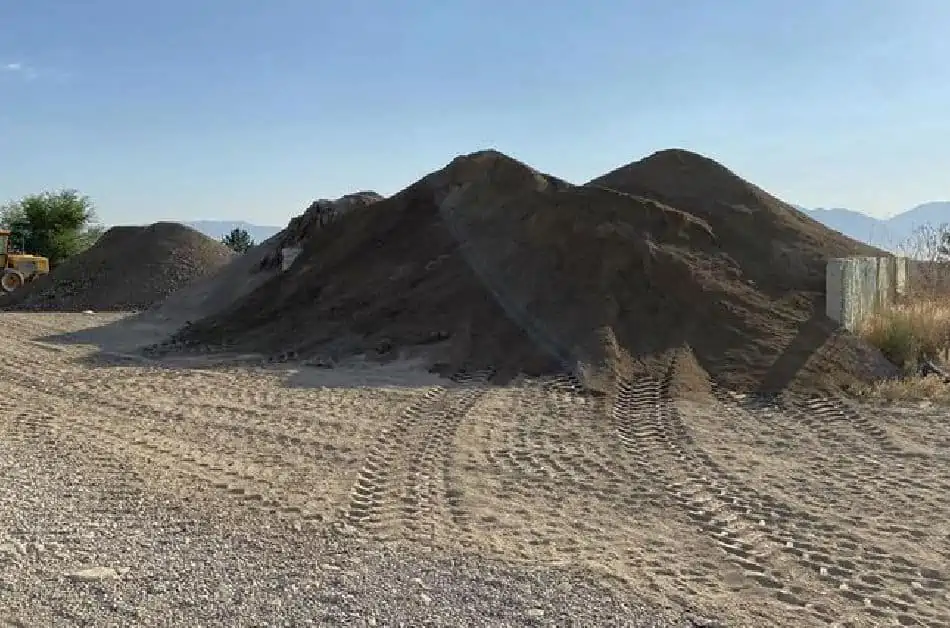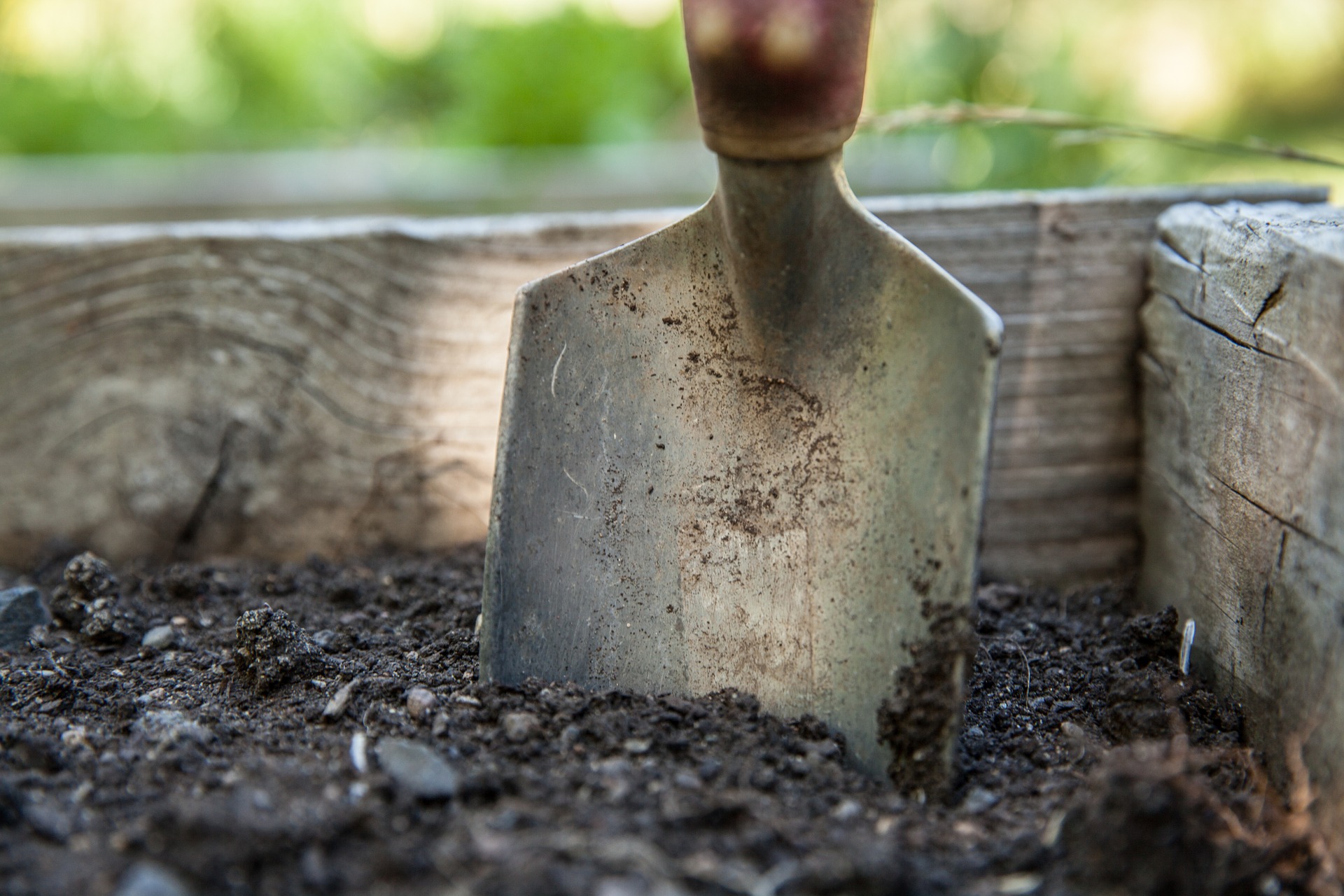As an Amazon Associate I earn from qualifying purchases.
I’ve seen so many people arguing about which is better for their garden: topsoil or compost. The level of misunderstanding in this “fake argument” has gotten old.
It makes me want to take my compost bin, upend it over the heads of the people arguing, and yell, “does that small like topsoil to you!?” Except I guess my compost does smell like topsoil…it’s great to compost.
Similar smell aside, compost and topsoil are completely different animals. So let’s dive into this issue and address a few concerns and false ideas that people seem to have when it comes to compost and topsoil.
First off, compost is not the same as topsoil. Compost is decomposed organic matter where topsoil is dirt that is rich in organic matter. Compost can be used to make or improve topsoil but should not be used as a replacement.
The Difference Between Compost and Topsoil
One of the most important ways for you to know when to use compost vs topsoil is to simply understand the difference in what they are made of and how they function
What Is topsoil and when should you use it?
Topsoil is the upper, outermost layer of soil, usually the top 5–10 inches. It has the highest concentration of organic matter and microorganisms and is where most of the Earth’s biological soil activity occurs. Topsoil is composed of mineral particles, organic matter, water, and air.
Depending on your location, topsoil is anywhere from 0 to 12 inches deep. If you (or your kids) like playing in the dirt, you like playing in topsoil.
Topsoil has a much higher concentration of organic matter than lower layers (since things die and decay on top of the ground). This, coupled with its high concentration of beneficial microorganisms, air, and the availability of water means that the majority of all biological activity (plant growth) on earth takes place in topsoil.
At least, that’s all true in theory. In a perfect world, topsoil would be in rich supply. And it was, up until a few hundred years ago. The thick luxurious topsoil that was once full of composted/decayed organic matter, nutrients, etc. has been largely removed by erosion of depleted by our current building/farming practices.
Because topsoil is the material that allows plants to take root and grow we have had to come up with artificial means (such as chemical fertilizers) of improving topsoil. In my backyard, for example, the dirt is so sandy and has not had natural plants grow on it for so long, that we can barely keep grass alive. We have to water it daily because it drains to fast and fertilize 2-3 times per year to ensure that the grass is getting what it needs.
This lack of topsoil has led many people to wonder if they can use compost as a topsoil replacement or grow their veggies directly in topsoil. However, this topsoil vs. compost debate often just shows a misunderstanding about what they two are and how they can be used.

Topsoil is a planting medium. You should not be planting anything directly in compost. However, you can use compost or other enriching mediums to create a soil that is useful in your garden, raised beds, for flowers, indoor pots, etc.
If you are looking to even out your lawn, create more efficient dirt for growing veggies, or do anything that will include plants taking root really, use topsoil. If your topsoil is crappy, it might mean that you need to take steps to improve it.
What is compost and where should you use it?
At the most basic level, compost is just rotten stuff that used to be alive. Of course, it’s a bit more complex than that, but that’s a general idea.
Imagine a forest that is teeming with life. The ground will be covered with organic material that is at some stage or turning back into dirt. The forest floor will be littered with pine needles, leaves, some rotting fruit, animal poop, dead trees, etc. When each of those things grew they drew nutrients out of the soil and incorporated them into their own structure. In their death, those nutrients are returned to enrich the soil.
Here’s the problem, when was the last time a pine tree dropped its needles on our garden? Or you let some deer poop and a squirrel decomposed on top of your veggies? Because most people’s gardens and lawns contain only the short and very limited range of plants that we plant, our soil ends up being depleted. Add into that the way that we, as humans, use our gardens and you’ll quickly understand why it’s necessary to “fix” your soil. Instead of plant matter dying and decaying in your garden, it is harvested and consumed.
Because of this, adding plant/organic matter back into the soil is necessary to keep it functioning at a high level. The types of things that are most beneficial for compost are things that you could imagine decaying in a fertile forest area. Things like fruits, grains, veggie scraps, leaves, grass clippings, etc. are all great components for making compost. Things that you wouldn’t find all over a forest floor such as oils, sugar, processed foods, milk, etc. are not things that you typically want in your compost and your soil.
You can choose to either buy or make your own compost (make your own, it’s easy) but, whichever you choose, compost will restore amazing topsoil to any place you want to plant something.
How To Correctly Use Compost To Fix Topsoil
Adding nutrients to your soil can take just about any level of complexity you want. Here are a few of the ways that we have utilized in the past to add some nutrition for our plants into the soil.
- Veggie scraps can be simply be buried in your garden. As they break down their nutrients will become bioavailable for plant use. A great example of this is the recent viral video from Self Sufficient Me:
- Another way to improve your soil is by simply creating a compost pile or buying a compost tumbler. While a tumbler is a bit more expensive than just piling up decomposing organic waste in your yard, neither of them will break the bank. As an added benefit, you are removing a huge amount of waste from your city’s solid waste system!
- Buying bags of local compost is another excellent way to get some nutrition into your topsoil. Avoid Amazon or Home Depot and search on Facebook for groups that either sell compost or will trade you compost for your own scraps and organic waste. In the topsoil vs. compost debate, compost will help create better topsoil that fertilizer ever could since it offers much, much more to the ground.
- Rotating plants will help to add nutrients back into the soil. For example, most garden plants deplete nitrogen from the soil as they grow but most members of the legume family (soybeans, alfalfa, clover, etc.) will fix nitrogen back into the soil.
- If composting or deal with compost doesn’t appeal to you, you can buy fertilizer. Just be sure to have your soil tested beforehand to see what it’s actual deficiencies are
If you follow one or more of the above tips, you’ll be able to vastly improve the health of your soil and increase the production of whatever is growing in it!
So, in the end, it’s not so much a question of topsoil vs. compost but a needed understanding of what each one is and how they work together to make your soil great!
As you might have guessed from the other content on our site, our method of choice is composting. You can find lots more information about getting started here! Good luck!
Other Articles You’ll Love
Can You Compost Oats? (A Guide to Oatmeal and Oat Products)
At A GlanceYes, you can compost oats and oatmeal as they are organic materials that…
Can You Compost Oil? (Yes, but only a little…)
At A GlanceIt’s not recommended to compost oil as it can cause several issues in…
Composting Nectarine Pits – What You Need to Know
At A GlanceComposting nectarine pits can be a bit challenging due to their hard and…
Composting Newspaper with Color Ink – What You Need to Know
At A GlanceYes, you can compost newspaper with color ink, but it’s preferable if the…
Can You Compost Noodles? A Starchy Foods Composting Guide
At A GlanceYes, you can compost noodles as they are a biodegradable organic matter. Whether…
Can You Compost Nut Shells? (Yes…but probably don’t…)
At A GlanceYes, you can compost nut shells, but there are certain considerations to be…

